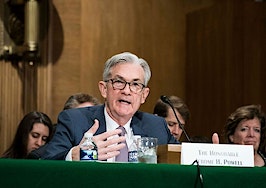Rates on 30-year, fixed-rate mortgage stayed beneath 3 percent for the third week in a row, welcome news for would be-homebuyers and homeowners who haven’t refinanced their mortgages yet.
That’s according to Freddie Mac’s weekly Primary Mortgage Market Survey, which showed 30-year, fixed-rate mortgages averaging 2.96 percent for the week ending May 6. The survey tracks conventional, conforming purchase loans for borrowers who put 20 percent down and have excellent credit, so many borrowers will pay higher rates.

Sam Khater | Photo credit: Freddie Mac
“Consumer income and spending are picking up, which is leading to an acceleration in economic growth,” said Freddie Mac Chief Economist Sam Khater, in a statement. “The combination of low and stable rates, coupled with an improving economy, is good for homebuyers. It’s also good for homeowners who may have missed prior opportunities to refinance and increase their monthly cash flow.”

Fannie Mae’s survey showed 30-year, fixed-rate mortgages bottomed out at 2.65 percent during the week ending Jan. 7, an all-time low in records dating to 1971, before marching back up to 3.18 percent by April 1.
A separate survey by the Mortgage Bankers Association found that mortgage purchase loan applications fell during the last two weeks of April. The drop was attributed to rising home prices and the scarcity of listings during this spring’s homebuying season, rather than rising rates.
Freddie Mac’s survey reported average rates for the following loan types:
- Rates on 30-year, fixed-rate mortgages averaged 2.96 percent with an average 0.6 point, down from 2.98 percent last week and 3.26 percent a year ago.
- For 15-year, fixed-rate mortgages, rates averaged 2.30 percent with an average 0.6 point, down from 2.31 percent last week and 2.73 percent a year ago.
- Rates on 5-year, Treasury-indexed hybrid adjustable-rate mortgage (ARM) loans averaged 2.70 percent with an average 0.3 point, up from 2.64 percent last week but down from 3.14 percent a year ago.
According to an analysis by Black Knight, the recent dip in mortgage rates has given an additional 3.4 million homeowners the incentive to refinance.

Source: Black Knight Mortgage Monitor.
Last week the Federal Reserve said it will keep trying to keep long-term interest rates low, by continuing to buy at least $80 billion in Treasury securities and $40 billion in mortgage-backed securities every month “until substantial further progress has been made” toward hitting the Fed’s employment and inflation goals.






